Innovation in Sainsbury and its Future Beyond 2022
VerifiedAdded on 2023/06/10
|15
|3981
|60
AI Summary
This report evaluates the innovative practices adopted by Sainsbury to make their future viable in terms of changing business environment. It assesses the frameworks to gain insights about innovative practices undertaken by Sainsbury. It also highlights the requirement by managers of Sainsbury to take in innovation to cope up with evolving business environment. The report also discusses the capabilities of a firm in order to bring innovation in business practices.
Contribute Materials
Your contribution can guide someone’s learning journey. Share your
documents today.

Written Report
Secure Best Marks with AI Grader
Need help grading? Try our AI Grader for instant feedback on your assignments.
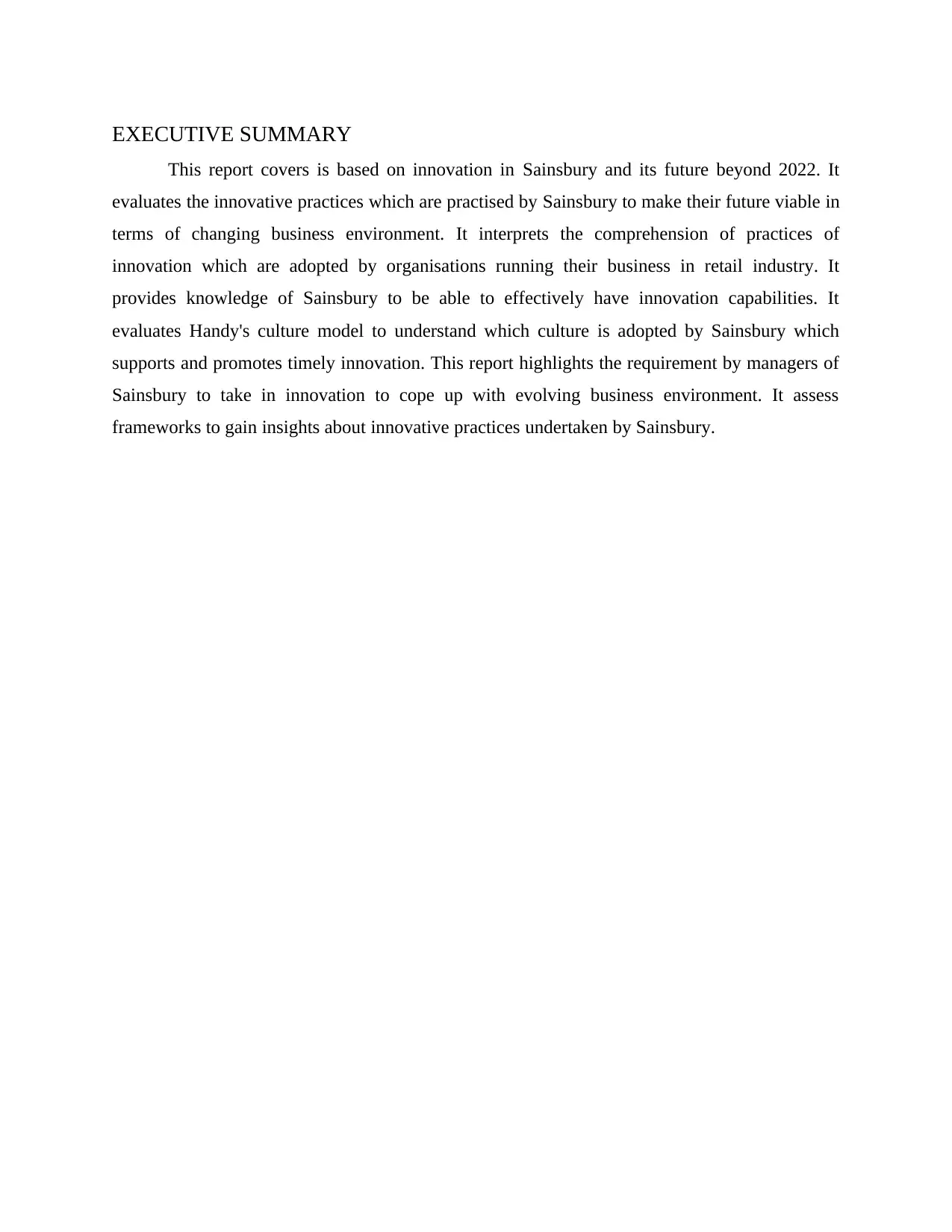
EXECUTIVE SUMMARY
This report covers is based on innovation in Sainsbury and its future beyond 2022. It
evaluates the innovative practices which are practised by Sainsbury to make their future viable in
terms of changing business environment. It interprets the comprehension of practices of
innovation which are adopted by organisations running their business in retail industry. It
provides knowledge of Sainsbury to be able to effectively have innovation capabilities. It
evaluates Handy's culture model to understand which culture is adopted by Sainsbury which
supports and promotes timely innovation. This report highlights the requirement by managers of
Sainsbury to take in innovation to cope up with evolving business environment. It assess
frameworks to gain insights about innovative practices undertaken by Sainsbury.
This report covers is based on innovation in Sainsbury and its future beyond 2022. It
evaluates the innovative practices which are practised by Sainsbury to make their future viable in
terms of changing business environment. It interprets the comprehension of practices of
innovation which are adopted by organisations running their business in retail industry. It
provides knowledge of Sainsbury to be able to effectively have innovation capabilities. It
evaluates Handy's culture model to understand which culture is adopted by Sainsbury which
supports and promotes timely innovation. This report highlights the requirement by managers of
Sainsbury to take in innovation to cope up with evolving business environment. It assess
frameworks to gain insights about innovative practices undertaken by Sainsbury.
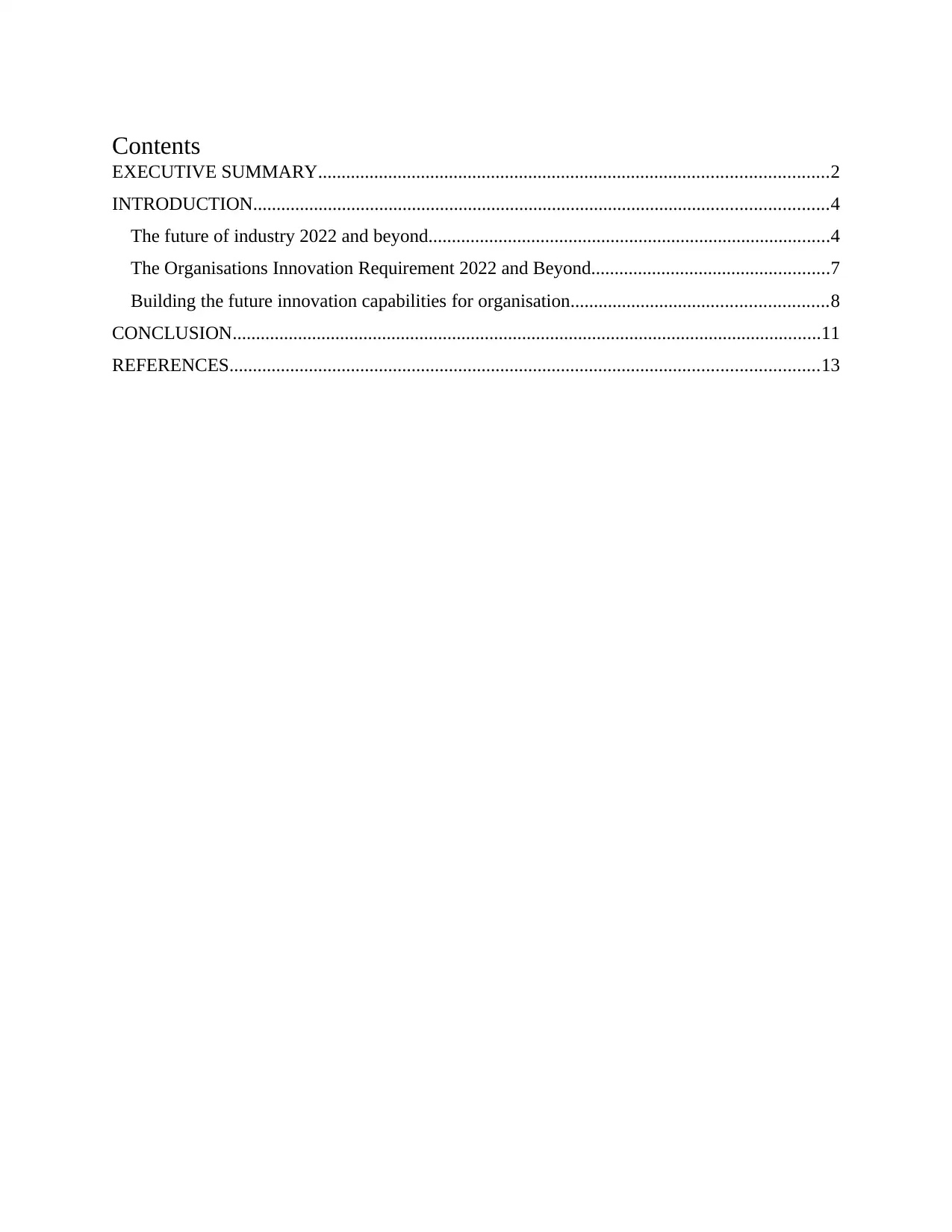
Contents
EXECUTIVE SUMMARY.............................................................................................................2
INTRODUCTION...........................................................................................................................4
The future of industry 2022 and beyond......................................................................................4
The Organisations Innovation Requirement 2022 and Beyond...................................................7
Building the future innovation capabilities for organisation.......................................................8
CONCLUSION..............................................................................................................................11
REFERENCES..............................................................................................................................13
EXECUTIVE SUMMARY.............................................................................................................2
INTRODUCTION...........................................................................................................................4
The future of industry 2022 and beyond......................................................................................4
The Organisations Innovation Requirement 2022 and Beyond...................................................7
Building the future innovation capabilities for organisation.......................................................8
CONCLUSION..............................................................................................................................11
REFERENCES..............................................................................................................................13

Secure Best Marks with AI Grader
Need help grading? Try our AI Grader for instant feedback on your assignments.
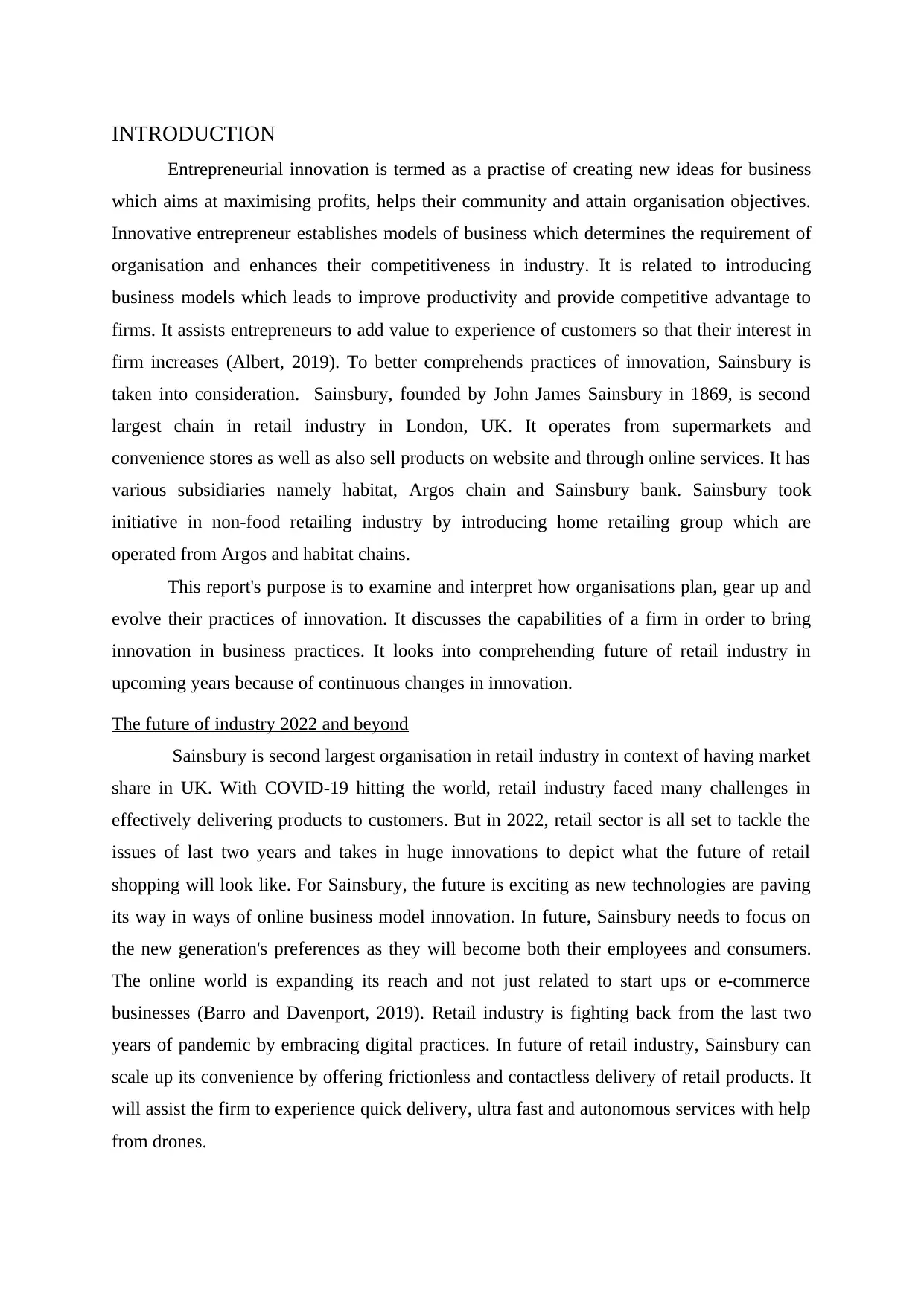
INTRODUCTION
Entrepreneurial innovation is termed as a practise of creating new ideas for business
which aims at maximising profits, helps their community and attain organisation objectives.
Innovative entrepreneur establishes models of business which determines the requirement of
organisation and enhances their competitiveness in industry. It is related to introducing
business models which leads to improve productivity and provide competitive advantage to
firms. It assists entrepreneurs to add value to experience of customers so that their interest in
firm increases (Albert, 2019). To better comprehends practices of innovation, Sainsbury is
taken into consideration. Sainsbury, founded by John James Sainsbury in 1869, is second
largest chain in retail industry in London, UK. It operates from supermarkets and
convenience stores as well as also sell products on website and through online services. It has
various subsidiaries namely habitat, Argos chain and Sainsbury bank. Sainsbury took
initiative in non-food retailing industry by introducing home retailing group which are
operated from Argos and habitat chains.
This report's purpose is to examine and interpret how organisations plan, gear up and
evolve their practices of innovation. It discusses the capabilities of a firm in order to bring
innovation in business practices. It looks into comprehending future of retail industry in
upcoming years because of continuous changes in innovation.
The future of industry 2022 and beyond
Sainsbury is second largest organisation in retail industry in context of having market
share in UK. With COVID-19 hitting the world, retail industry faced many challenges in
effectively delivering products to customers. But in 2022, retail sector is all set to tackle the
issues of last two years and takes in huge innovations to depict what the future of retail
shopping will look like. For Sainsbury, the future is exciting as new technologies are paving
its way in ways of online business model innovation. In future, Sainsbury needs to focus on
the new generation's preferences as they will become both their employees and consumers.
The online world is expanding its reach and not just related to start ups or e-commerce
businesses (Barro and Davenport, 2019). Retail industry is fighting back from the last two
years of pandemic by embracing digital practices. In future of retail industry, Sainsbury can
scale up its convenience by offering frictionless and contactless delivery of retail products. It
will assist the firm to experience quick delivery, ultra fast and autonomous services with help
from drones.
Entrepreneurial innovation is termed as a practise of creating new ideas for business
which aims at maximising profits, helps their community and attain organisation objectives.
Innovative entrepreneur establishes models of business which determines the requirement of
organisation and enhances their competitiveness in industry. It is related to introducing
business models which leads to improve productivity and provide competitive advantage to
firms. It assists entrepreneurs to add value to experience of customers so that their interest in
firm increases (Albert, 2019). To better comprehends practices of innovation, Sainsbury is
taken into consideration. Sainsbury, founded by John James Sainsbury in 1869, is second
largest chain in retail industry in London, UK. It operates from supermarkets and
convenience stores as well as also sell products on website and through online services. It has
various subsidiaries namely habitat, Argos chain and Sainsbury bank. Sainsbury took
initiative in non-food retailing industry by introducing home retailing group which are
operated from Argos and habitat chains.
This report's purpose is to examine and interpret how organisations plan, gear up and
evolve their practices of innovation. It discusses the capabilities of a firm in order to bring
innovation in business practices. It looks into comprehending future of retail industry in
upcoming years because of continuous changes in innovation.
The future of industry 2022 and beyond
Sainsbury is second largest organisation in retail industry in context of having market
share in UK. With COVID-19 hitting the world, retail industry faced many challenges in
effectively delivering products to customers. But in 2022, retail sector is all set to tackle the
issues of last two years and takes in huge innovations to depict what the future of retail
shopping will look like. For Sainsbury, the future is exciting as new technologies are paving
its way in ways of online business model innovation. In future, Sainsbury needs to focus on
the new generation's preferences as they will become both their employees and consumers.
The online world is expanding its reach and not just related to start ups or e-commerce
businesses (Barro and Davenport, 2019). Retail industry is fighting back from the last two
years of pandemic by embracing digital practices. In future of retail industry, Sainsbury can
scale up its convenience by offering frictionless and contactless delivery of retail products. It
will assist the firm to experience quick delivery, ultra fast and autonomous services with help
from drones.
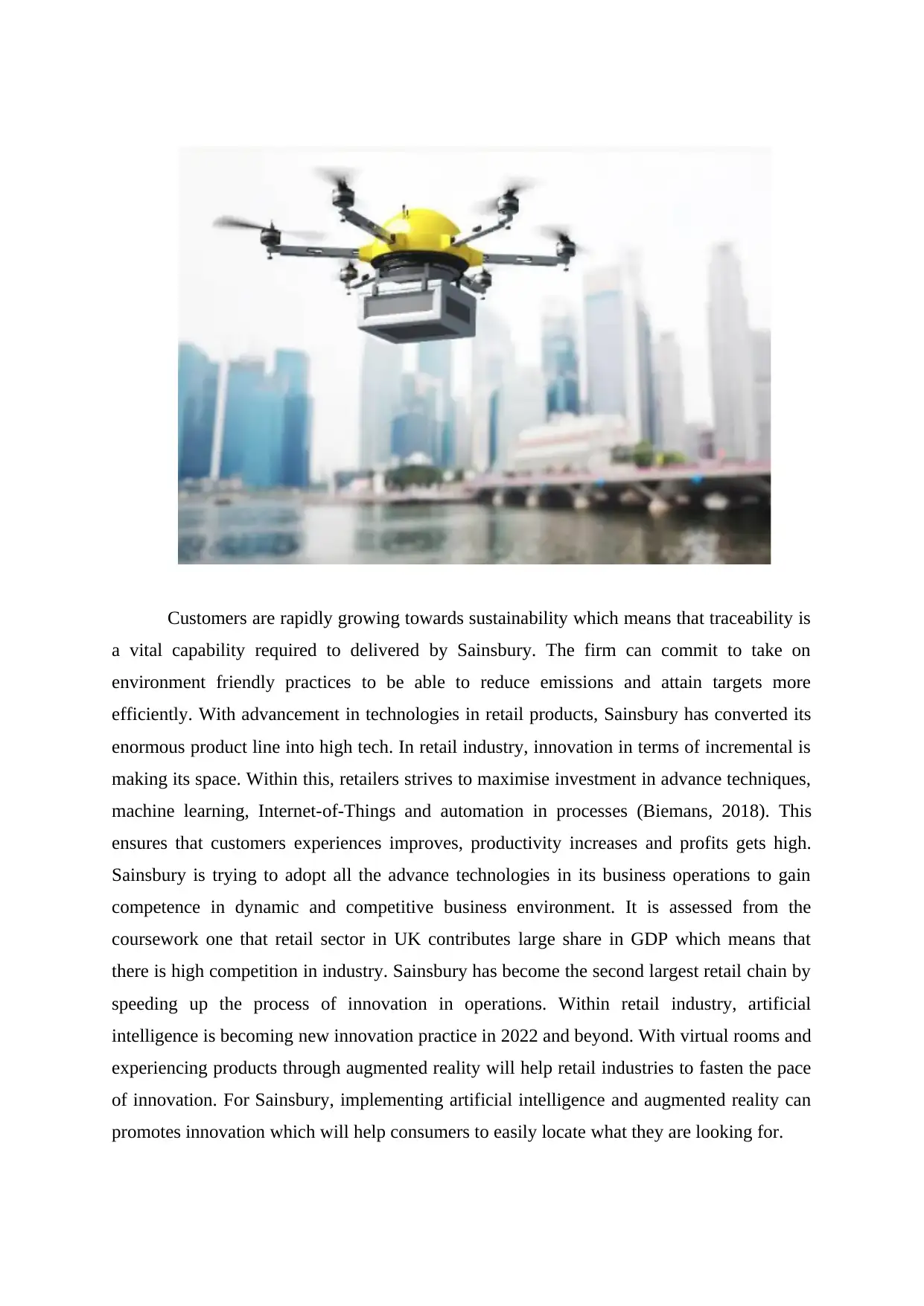
Customers are rapidly growing towards sustainability which means that traceability is
a vital capability required to delivered by Sainsbury. The firm can commit to take on
environment friendly practices to be able to reduce emissions and attain targets more
efficiently. With advancement in technologies in retail products, Sainsbury has converted its
enormous product line into high tech. In retail industry, innovation in terms of incremental is
making its space. Within this, retailers strives to maximise investment in advance techniques,
machine learning, Internet-of-Things and automation in processes (Biemans, 2018). This
ensures that customers experiences improves, productivity increases and profits gets high.
Sainsbury is trying to adopt all the advance technologies in its business operations to gain
competence in dynamic and competitive business environment. It is assessed from the
coursework one that retail sector in UK contributes large share in GDP which means that
there is high competition in industry. Sainsbury has become the second largest retail chain by
speeding up the process of innovation in operations. Within retail industry, artificial
intelligence is becoming new innovation practice in 2022 and beyond. With virtual rooms and
experiencing products through augmented reality will help retail industries to fasten the pace
of innovation. For Sainsbury, implementing artificial intelligence and augmented reality can
promotes innovation which will help consumers to easily locate what they are looking for.
a vital capability required to delivered by Sainsbury. The firm can commit to take on
environment friendly practices to be able to reduce emissions and attain targets more
efficiently. With advancement in technologies in retail products, Sainsbury has converted its
enormous product line into high tech. In retail industry, innovation in terms of incremental is
making its space. Within this, retailers strives to maximise investment in advance techniques,
machine learning, Internet-of-Things and automation in processes (Biemans, 2018). This
ensures that customers experiences improves, productivity increases and profits gets high.
Sainsbury is trying to adopt all the advance technologies in its business operations to gain
competence in dynamic and competitive business environment. It is assessed from the
coursework one that retail sector in UK contributes large share in GDP which means that
there is high competition in industry. Sainsbury has become the second largest retail chain by
speeding up the process of innovation in operations. Within retail industry, artificial
intelligence is becoming new innovation practice in 2022 and beyond. With virtual rooms and
experiencing products through augmented reality will help retail industries to fasten the pace
of innovation. For Sainsbury, implementing artificial intelligence and augmented reality can
promotes innovation which will help consumers to easily locate what they are looking for.
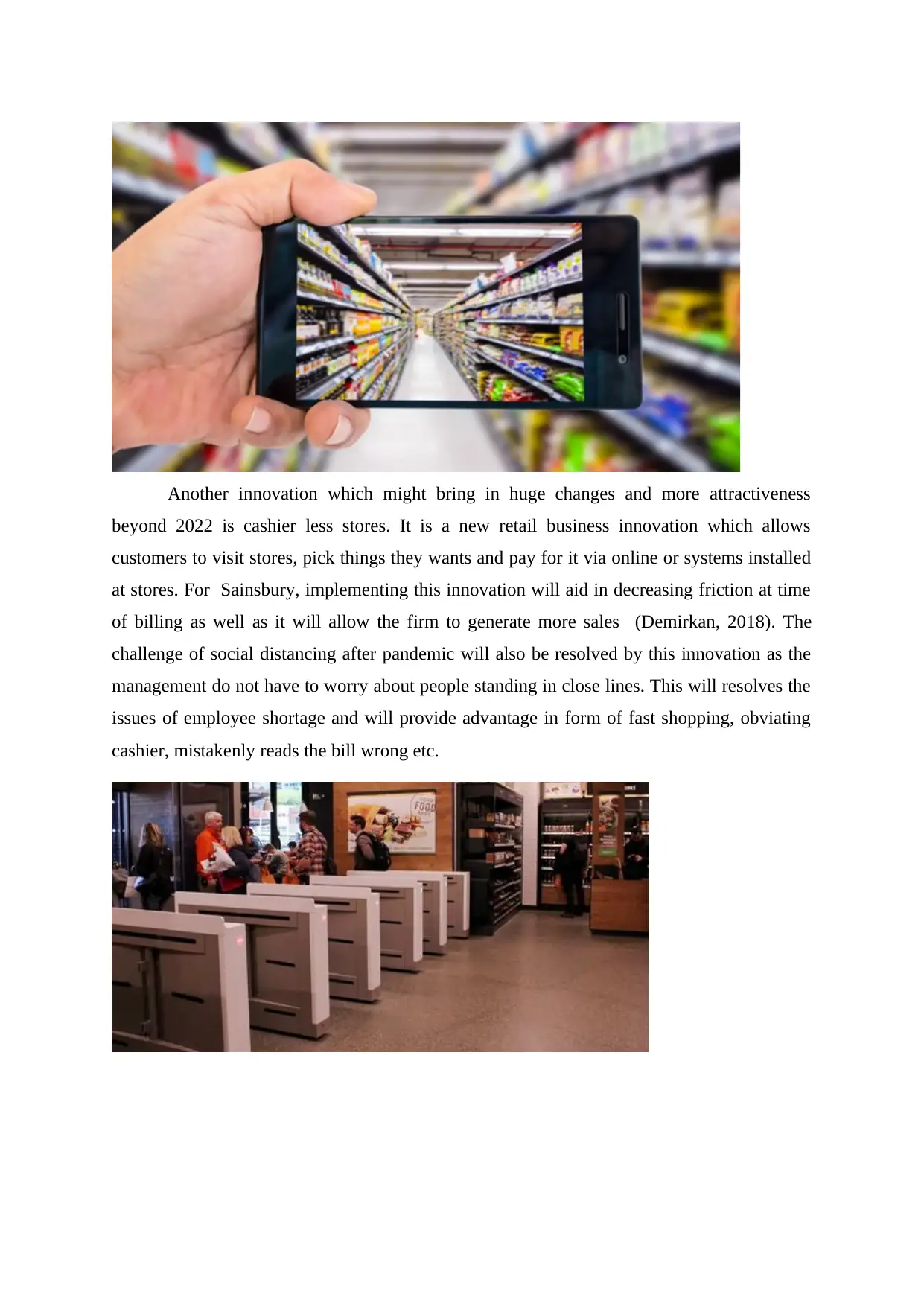
Another innovation which might bring in huge changes and more attractiveness
beyond 2022 is cashier less stores. It is a new retail business innovation which allows
customers to visit stores, pick things they wants and pay for it via online or systems installed
at stores. For Sainsbury, implementing this innovation will aid in decreasing friction at time
of billing as well as it will allow the firm to generate more sales (Demirkan, 2018). The
challenge of social distancing after pandemic will also be resolved by this innovation as the
management do not have to worry about people standing in close lines. This will resolves the
issues of employee shortage and will provide advantage in form of fast shopping, obviating
cashier, mistakenly reads the bill wrong etc.
beyond 2022 is cashier less stores. It is a new retail business innovation which allows
customers to visit stores, pick things they wants and pay for it via online or systems installed
at stores. For Sainsbury, implementing this innovation will aid in decreasing friction at time
of billing as well as it will allow the firm to generate more sales (Demirkan, 2018). The
challenge of social distancing after pandemic will also be resolved by this innovation as the
management do not have to worry about people standing in close lines. This will resolves the
issues of employee shortage and will provide advantage in form of fast shopping, obviating
cashier, mistakenly reads the bill wrong etc.
Paraphrase This Document
Need a fresh take? Get an instant paraphrase of this document with our AI Paraphraser
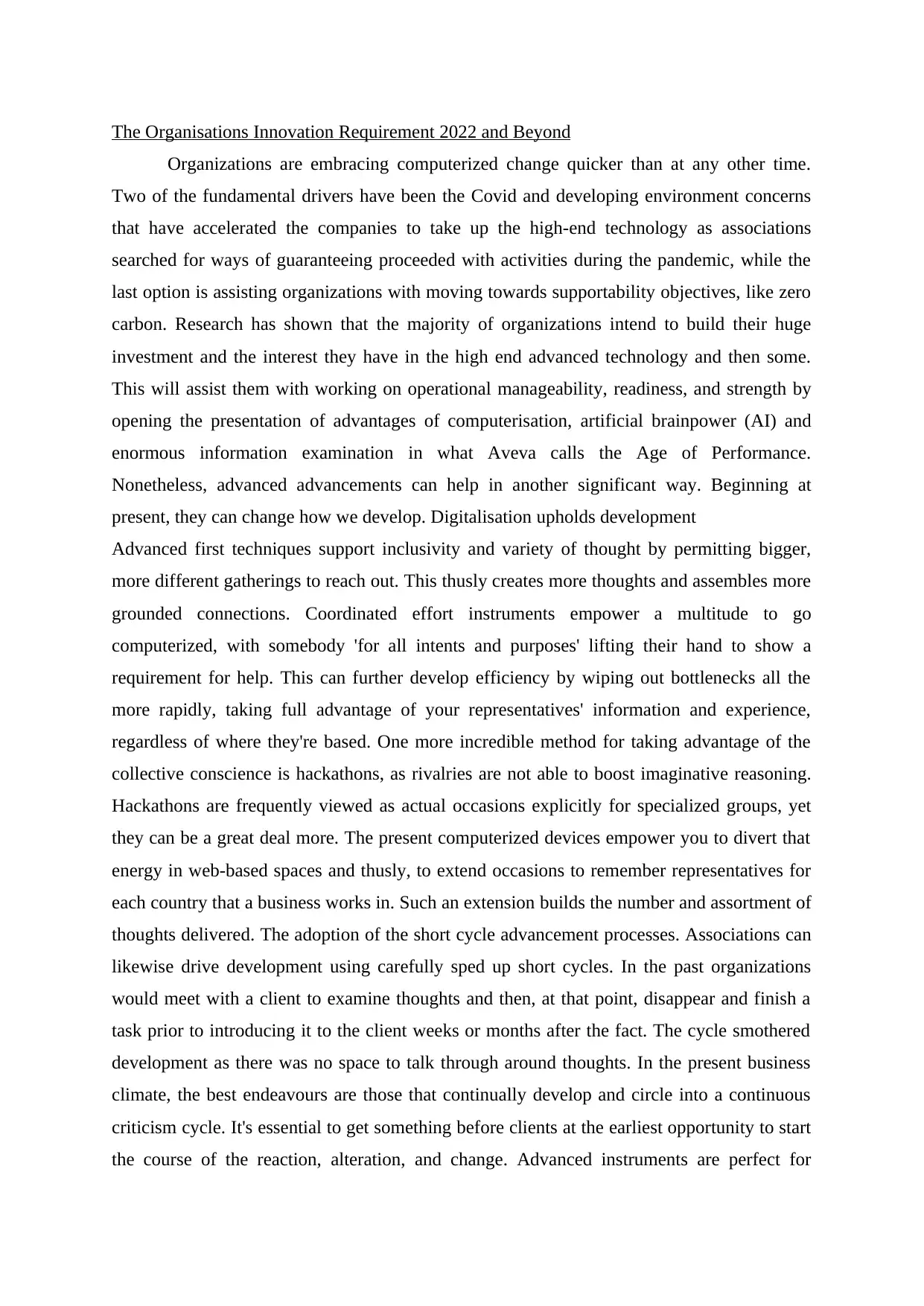
The Organisations Innovation Requirement 2022 and Beyond
Organizations are embracing computerized change quicker than at any other time.
Two of the fundamental drivers have been the Covid and developing environment concerns
that have accelerated the companies to take up the high-end technology as associations
searched for ways of guaranteeing proceeded with activities during the pandemic, while the
last option is assisting organizations with moving towards supportability objectives, like zero
carbon. Research has shown that the majority of organizations intend to build their huge
investment and the interest they have in the high end advanced technology and then some.
This will assist them with working on operational manageability, readiness, and strength by
opening the presentation of advantages of computerisation, artificial brainpower (AI) and
enormous information examination in what Aveva calls the Age of Performance.
Nonetheless, advanced advancements can help in another significant way. Beginning at
present, they can change how we develop. Digitalisation upholds development
Advanced first techniques support inclusivity and variety of thought by permitting bigger,
more different gatherings to reach out. This thusly creates more thoughts and assembles more
grounded connections. Coordinated effort instruments empower a multitude to go
computerized, with somebody 'for all intents and purposes' lifting their hand to show a
requirement for help. This can further develop efficiency by wiping out bottlenecks all the
more rapidly, taking full advantage of your representatives' information and experience,
regardless of where they're based. One more incredible method for taking advantage of the
collective conscience is hackathons, as rivalries are not able to boost imaginative reasoning.
Hackathons are frequently viewed as actual occasions explicitly for specialized groups, yet
they can be a great deal more. The present computerized devices empower you to divert that
energy in web-based spaces and thusly, to extend occasions to remember representatives for
each country that a business works in. Such an extension builds the number and assortment of
thoughts delivered. The adoption of the short cycle advancement processes. Associations can
likewise drive development using carefully sped up short cycles. In the past organizations
would meet with a client to examine thoughts and then, at that point, disappear and finish a
task prior to introducing it to the client weeks or months after the fact. The cycle smothered
development as there was no space to talk through around thoughts. In the present business
climate, the best endeavours are those that continually develop and circle into a continuous
criticism cycle. It's essential to get something before clients at the earliest opportunity to start
the course of the reaction, alteration, and change. Advanced instruments are perfect for
Organizations are embracing computerized change quicker than at any other time.
Two of the fundamental drivers have been the Covid and developing environment concerns
that have accelerated the companies to take up the high-end technology as associations
searched for ways of guaranteeing proceeded with activities during the pandemic, while the
last option is assisting organizations with moving towards supportability objectives, like zero
carbon. Research has shown that the majority of organizations intend to build their huge
investment and the interest they have in the high end advanced technology and then some.
This will assist them with working on operational manageability, readiness, and strength by
opening the presentation of advantages of computerisation, artificial brainpower (AI) and
enormous information examination in what Aveva calls the Age of Performance.
Nonetheless, advanced advancements can help in another significant way. Beginning at
present, they can change how we develop. Digitalisation upholds development
Advanced first techniques support inclusivity and variety of thought by permitting bigger,
more different gatherings to reach out. This thusly creates more thoughts and assembles more
grounded connections. Coordinated effort instruments empower a multitude to go
computerized, with somebody 'for all intents and purposes' lifting their hand to show a
requirement for help. This can further develop efficiency by wiping out bottlenecks all the
more rapidly, taking full advantage of your representatives' information and experience,
regardless of where they're based. One more incredible method for taking advantage of the
collective conscience is hackathons, as rivalries are not able to boost imaginative reasoning.
Hackathons are frequently viewed as actual occasions explicitly for specialized groups, yet
they can be a great deal more. The present computerized devices empower you to divert that
energy in web-based spaces and thusly, to extend occasions to remember representatives for
each country that a business works in. Such an extension builds the number and assortment of
thoughts delivered. The adoption of the short cycle advancement processes. Associations can
likewise drive development using carefully sped up short cycles. In the past organizations
would meet with a client to examine thoughts and then, at that point, disappear and finish a
task prior to introducing it to the client weeks or months after the fact. The cycle smothered
development as there was no space to talk through around thoughts. In the present business
climate, the best endeavours are those that continually develop and circle into a continuous
criticism cycle. It's essential to get something before clients at the earliest opportunity to start
the course of the reaction, alteration, and change. Advanced instruments are perfect for
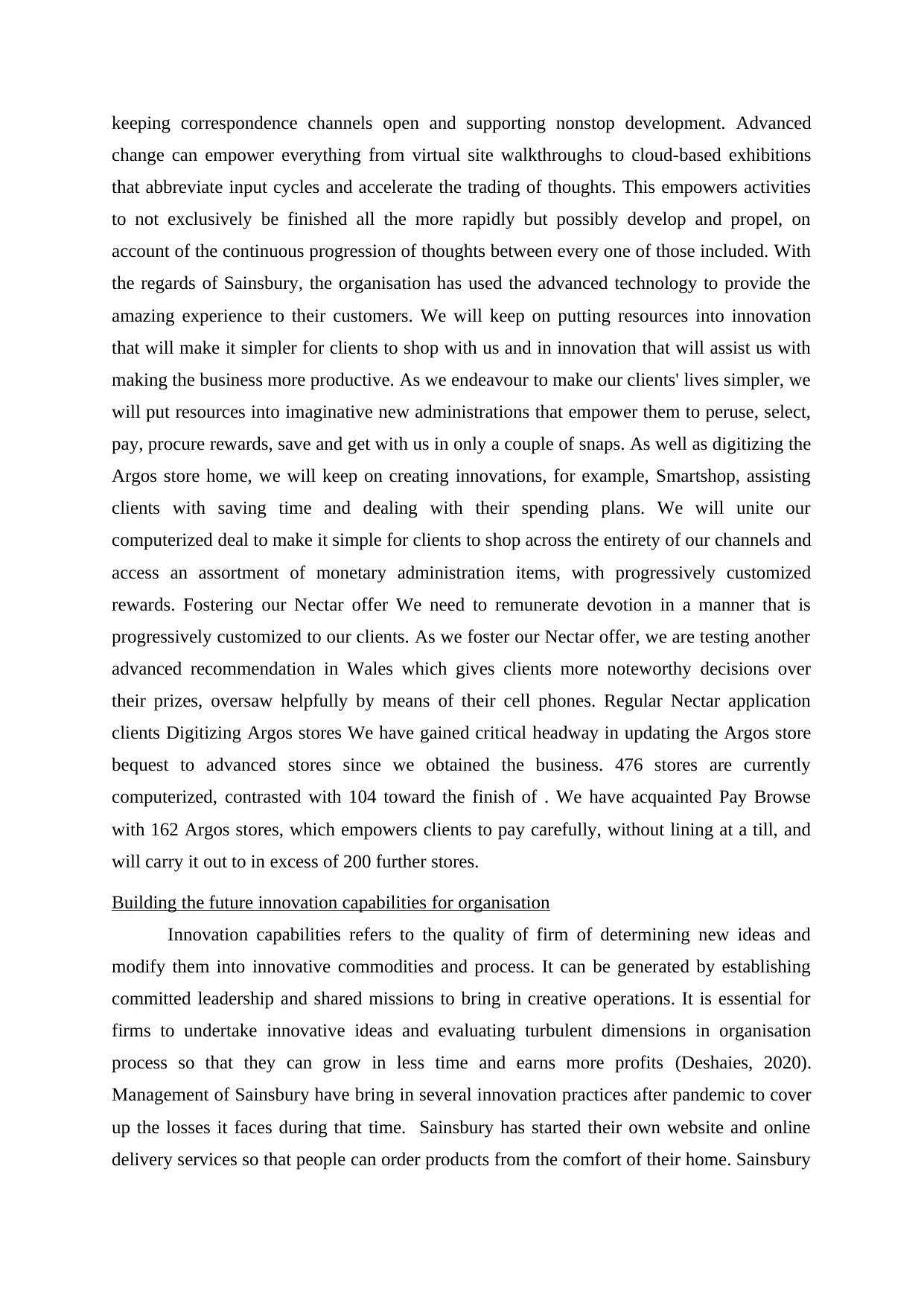
keeping correspondence channels open and supporting nonstop development. Advanced
change can empower everything from virtual site walkthroughs to cloud-based exhibitions
that abbreviate input cycles and accelerate the trading of thoughts. This empowers activities
to not exclusively be finished all the more rapidly but possibly develop and propel, on
account of the continuous progression of thoughts between every one of those included. With
the regards of Sainsbury, the organisation has used the advanced technology to provide the
amazing experience to their customers. We will keep on putting resources into innovation
that will make it simpler for clients to shop with us and in innovation that will assist us with
making the business more productive. As we endeavour to make our clients' lives simpler, we
will put resources into imaginative new administrations that empower them to peruse, select,
pay, procure rewards, save and get with us in only a couple of snaps. As well as digitizing the
Argos store home, we will keep on creating innovations, for example, Smartshop, assisting
clients with saving time and dealing with their spending plans. We will unite our
computerized deal to make it simple for clients to shop across the entirety of our channels and
access an assortment of monetary administration items, with progressively customized
rewards. Fostering our Nectar offer We need to remunerate devotion in a manner that is
progressively customized to our clients. As we foster our Nectar offer, we are testing another
advanced recommendation in Wales which gives clients more noteworthy decisions over
their prizes, oversaw helpfully by means of their cell phones. Regular Nectar application
clients Digitizing Argos stores We have gained critical headway in updating the Argos store
bequest to advanced stores since we obtained the business. 476 stores are currently
computerized, contrasted with 104 toward the finish of . We have acquainted Pay Browse
with 162 Argos stores, which empowers clients to pay carefully, without lining at a till, and
will carry it out to in excess of 200 further stores.
Building the future innovation capabilities for organisation
Innovation capabilities refers to the quality of firm of determining new ideas and
modify them into innovative commodities and process. It can be generated by establishing
committed leadership and shared missions to bring in creative operations. It is essential for
firms to undertake innovative ideas and evaluating turbulent dimensions in organisation
process so that they can grow in less time and earns more profits (Deshaies, 2020).
Management of Sainsbury have bring in several innovation practices after pandemic to cover
up the losses it faces during that time. Sainsbury has started their own website and online
delivery services so that people can order products from the comfort of their home. Sainsbury
change can empower everything from virtual site walkthroughs to cloud-based exhibitions
that abbreviate input cycles and accelerate the trading of thoughts. This empowers activities
to not exclusively be finished all the more rapidly but possibly develop and propel, on
account of the continuous progression of thoughts between every one of those included. With
the regards of Sainsbury, the organisation has used the advanced technology to provide the
amazing experience to their customers. We will keep on putting resources into innovation
that will make it simpler for clients to shop with us and in innovation that will assist us with
making the business more productive. As we endeavour to make our clients' lives simpler, we
will put resources into imaginative new administrations that empower them to peruse, select,
pay, procure rewards, save and get with us in only a couple of snaps. As well as digitizing the
Argos store home, we will keep on creating innovations, for example, Smartshop, assisting
clients with saving time and dealing with their spending plans. We will unite our
computerized deal to make it simple for clients to shop across the entirety of our channels and
access an assortment of monetary administration items, with progressively customized
rewards. Fostering our Nectar offer We need to remunerate devotion in a manner that is
progressively customized to our clients. As we foster our Nectar offer, we are testing another
advanced recommendation in Wales which gives clients more noteworthy decisions over
their prizes, oversaw helpfully by means of their cell phones. Regular Nectar application
clients Digitizing Argos stores We have gained critical headway in updating the Argos store
bequest to advanced stores since we obtained the business. 476 stores are currently
computerized, contrasted with 104 toward the finish of . We have acquainted Pay Browse
with 162 Argos stores, which empowers clients to pay carefully, without lining at a till, and
will carry it out to in excess of 200 further stores.
Building the future innovation capabilities for organisation
Innovation capabilities refers to the quality of firm of determining new ideas and
modify them into innovative commodities and process. It can be generated by establishing
committed leadership and shared missions to bring in creative operations. It is essential for
firms to undertake innovative ideas and evaluating turbulent dimensions in organisation
process so that they can grow in less time and earns more profits (Deshaies, 2020).
Management of Sainsbury have bring in several innovation practices after pandemic to cover
up the losses it faces during that time. Sainsbury has started their own website and online
delivery services so that people can order products from the comfort of their home. Sainsbury
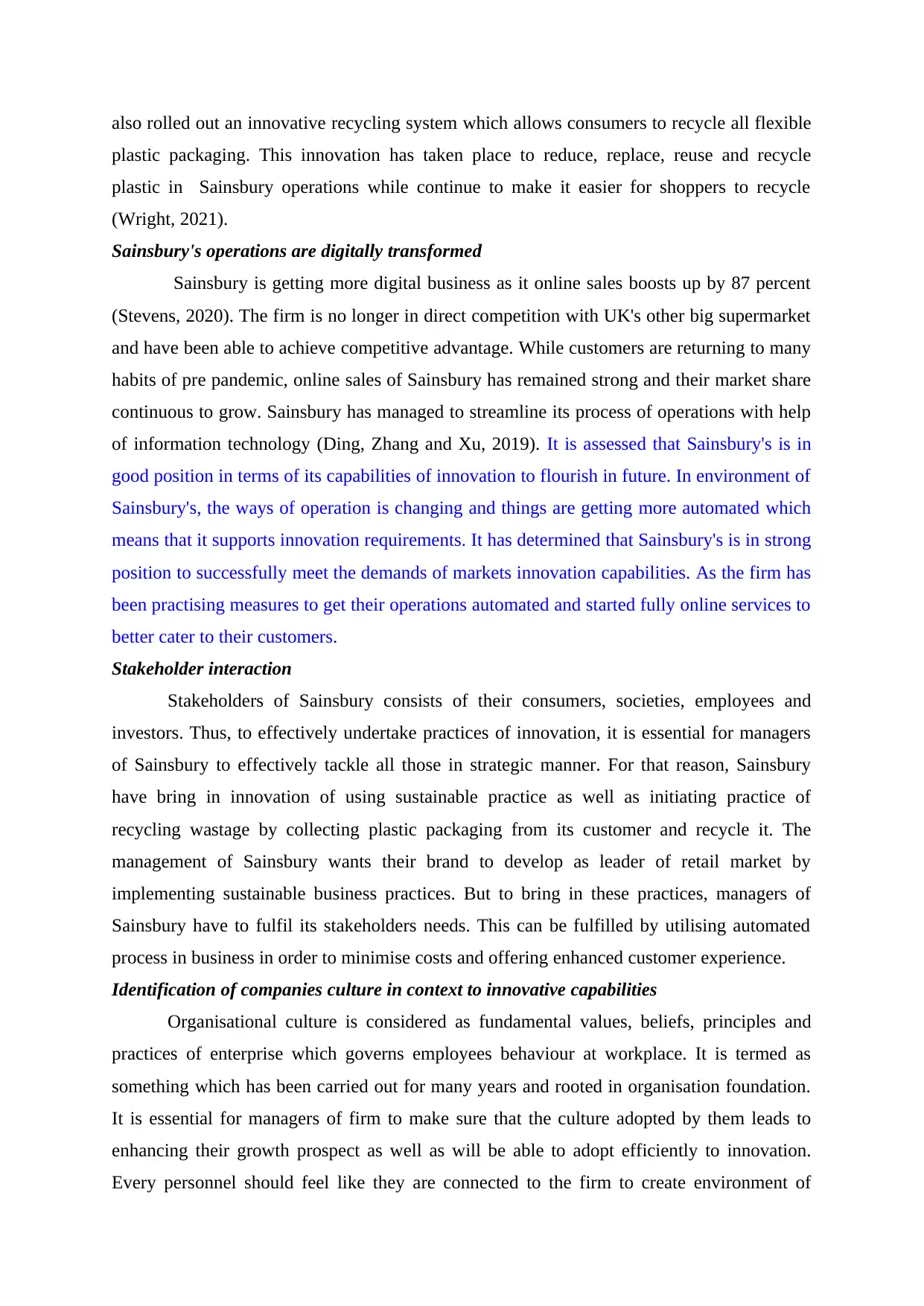
also rolled out an innovative recycling system which allows consumers to recycle all flexible
plastic packaging. This innovation has taken place to reduce, replace, reuse and recycle
plastic in Sainsbury operations while continue to make it easier for shoppers to recycle
(Wright, 2021).
Sainsbury's operations are digitally transformed
Sainsbury is getting more digital business as it online sales boosts up by 87 percent
(Stevens, 2020). The firm is no longer in direct competition with UK's other big supermarket
and have been able to achieve competitive advantage. While customers are returning to many
habits of pre pandemic, online sales of Sainsbury has remained strong and their market share
continuous to grow. Sainsbury has managed to streamline its process of operations with help
of information technology (Ding, Zhang and Xu, 2019). It is assessed that Sainsbury's is in
good position in terms of its capabilities of innovation to flourish in future. In environment of
Sainsbury's, the ways of operation is changing and things are getting more automated which
means that it supports innovation requirements. It has determined that Sainsbury's is in strong
position to successfully meet the demands of markets innovation capabilities. As the firm has
been practising measures to get their operations automated and started fully online services to
better cater to their customers.
Stakeholder interaction
Stakeholders of Sainsbury consists of their consumers, societies, employees and
investors. Thus, to effectively undertake practices of innovation, it is essential for managers
of Sainsbury to effectively tackle all those in strategic manner. For that reason, Sainsbury
have bring in innovation of using sustainable practice as well as initiating practice of
recycling wastage by collecting plastic packaging from its customer and recycle it. The
management of Sainsbury wants their brand to develop as leader of retail market by
implementing sustainable business practices. But to bring in these practices, managers of
Sainsbury have to fulfil its stakeholders needs. This can be fulfilled by utilising automated
process in business in order to minimise costs and offering enhanced customer experience.
Identification of companies culture in context to innovative capabilities
Organisational culture is considered as fundamental values, beliefs, principles and
practices of enterprise which governs employees behaviour at workplace. It is termed as
something which has been carried out for many years and rooted in organisation foundation.
It is essential for managers of firm to make sure that the culture adopted by them leads to
enhancing their growth prospect as well as will be able to adopt efficiently to innovation.
Every personnel should feel like they are connected to the firm to create environment of
plastic packaging. This innovation has taken place to reduce, replace, reuse and recycle
plastic in Sainsbury operations while continue to make it easier for shoppers to recycle
(Wright, 2021).
Sainsbury's operations are digitally transformed
Sainsbury is getting more digital business as it online sales boosts up by 87 percent
(Stevens, 2020). The firm is no longer in direct competition with UK's other big supermarket
and have been able to achieve competitive advantage. While customers are returning to many
habits of pre pandemic, online sales of Sainsbury has remained strong and their market share
continuous to grow. Sainsbury has managed to streamline its process of operations with help
of information technology (Ding, Zhang and Xu, 2019). It is assessed that Sainsbury's is in
good position in terms of its capabilities of innovation to flourish in future. In environment of
Sainsbury's, the ways of operation is changing and things are getting more automated which
means that it supports innovation requirements. It has determined that Sainsbury's is in strong
position to successfully meet the demands of markets innovation capabilities. As the firm has
been practising measures to get their operations automated and started fully online services to
better cater to their customers.
Stakeholder interaction
Stakeholders of Sainsbury consists of their consumers, societies, employees and
investors. Thus, to effectively undertake practices of innovation, it is essential for managers
of Sainsbury to effectively tackle all those in strategic manner. For that reason, Sainsbury
have bring in innovation of using sustainable practice as well as initiating practice of
recycling wastage by collecting plastic packaging from its customer and recycle it. The
management of Sainsbury wants their brand to develop as leader of retail market by
implementing sustainable business practices. But to bring in these practices, managers of
Sainsbury have to fulfil its stakeholders needs. This can be fulfilled by utilising automated
process in business in order to minimise costs and offering enhanced customer experience.
Identification of companies culture in context to innovative capabilities
Organisational culture is considered as fundamental values, beliefs, principles and
practices of enterprise which governs employees behaviour at workplace. It is termed as
something which has been carried out for many years and rooted in organisation foundation.
It is essential for managers of firm to make sure that the culture adopted by them leads to
enhancing their growth prospect as well as will be able to adopt efficiently to innovation.
Every personnel should feel like they are connected to the firm to create environment of
Secure Best Marks with AI Grader
Need help grading? Try our AI Grader for instant feedback on your assignments.
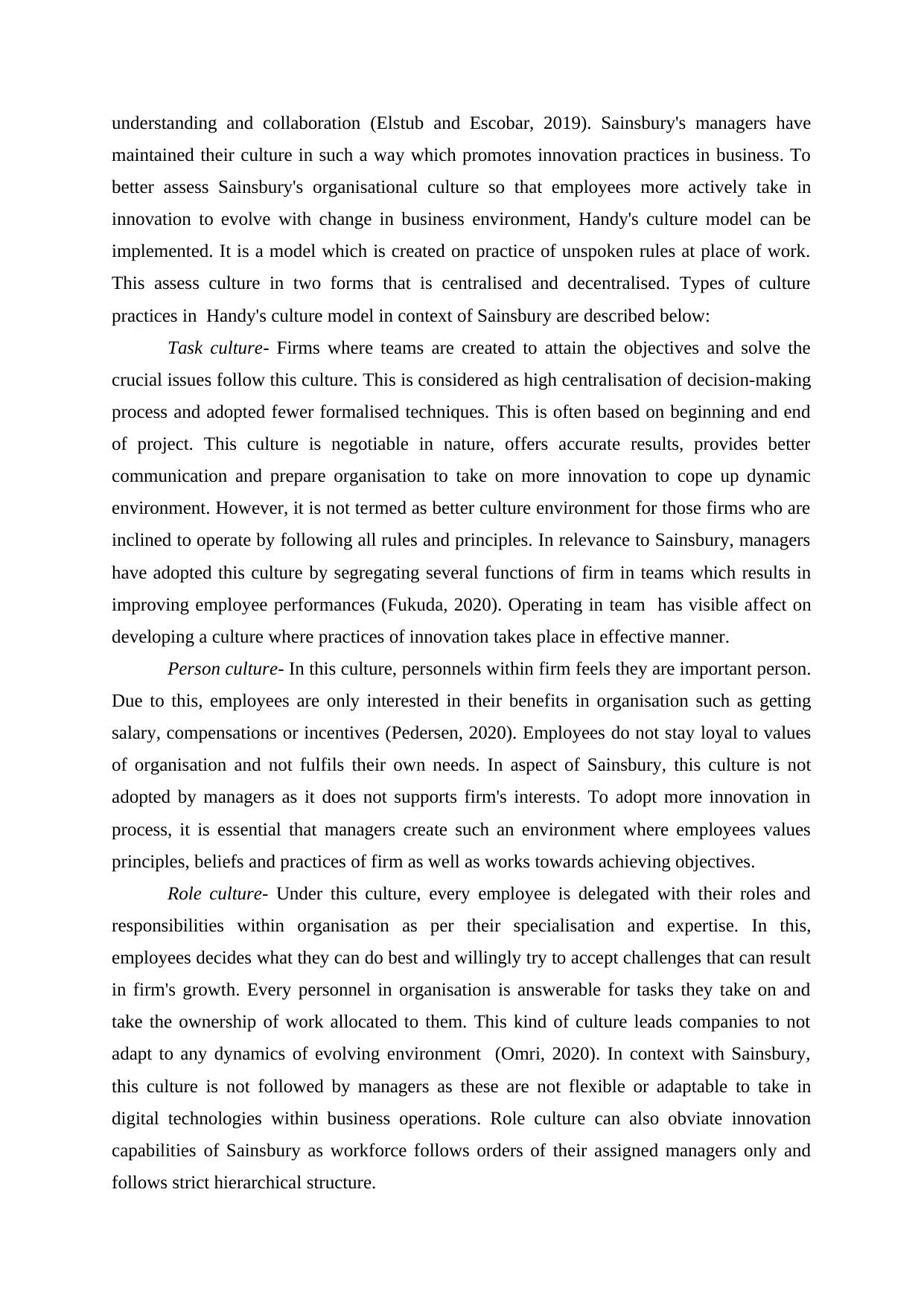
understanding and collaboration (Elstub and Escobar, 2019). Sainsbury's managers have
maintained their culture in such a way which promotes innovation practices in business. To
better assess Sainsbury's organisational culture so that employees more actively take in
innovation to evolve with change in business environment, Handy's culture model can be
implemented. It is a model which is created on practice of unspoken rules at place of work.
This assess culture in two forms that is centralised and decentralised. Types of culture
practices in Handy's culture model in context of Sainsbury are described below:
Task culture- Firms where teams are created to attain the objectives and solve the
crucial issues follow this culture. This is considered as high centralisation of decision-making
process and adopted fewer formalised techniques. This is often based on beginning and end
of project. This culture is negotiable in nature, offers accurate results, provides better
communication and prepare organisation to take on more innovation to cope up dynamic
environment. However, it is not termed as better culture environment for those firms who are
inclined to operate by following all rules and principles. In relevance to Sainsbury, managers
have adopted this culture by segregating several functions of firm in teams which results in
improving employee performances (Fukuda, 2020). Operating in team has visible affect on
developing a culture where practices of innovation takes place in effective manner.
Person culture- In this culture, personnels within firm feels they are important person.
Due to this, employees are only interested in their benefits in organisation such as getting
salary, compensations or incentives (Pedersen, 2020). Employees do not stay loyal to values
of organisation and not fulfils their own needs. In aspect of Sainsbury, this culture is not
adopted by managers as it does not supports firm's interests. To adopt more innovation in
process, it is essential that managers create such an environment where employees values
principles, beliefs and practices of firm as well as works towards achieving objectives.
Role culture- Under this culture, every employee is delegated with their roles and
responsibilities within organisation as per their specialisation and expertise. In this,
employees decides what they can do best and willingly try to accept challenges that can result
in firm's growth. Every personnel in organisation is answerable for tasks they take on and
take the ownership of work allocated to them. This kind of culture leads companies to not
adapt to any dynamics of evolving environment (Omri, 2020). In context with Sainsbury,
this culture is not followed by managers as these are not flexible or adaptable to take in
digital technologies within business operations. Role culture can also obviate innovation
capabilities of Sainsbury as workforce follows orders of their assigned managers only and
follows strict hierarchical structure.
maintained their culture in such a way which promotes innovation practices in business. To
better assess Sainsbury's organisational culture so that employees more actively take in
innovation to evolve with change in business environment, Handy's culture model can be
implemented. It is a model which is created on practice of unspoken rules at place of work.
This assess culture in two forms that is centralised and decentralised. Types of culture
practices in Handy's culture model in context of Sainsbury are described below:
Task culture- Firms where teams are created to attain the objectives and solve the
crucial issues follow this culture. This is considered as high centralisation of decision-making
process and adopted fewer formalised techniques. This is often based on beginning and end
of project. This culture is negotiable in nature, offers accurate results, provides better
communication and prepare organisation to take on more innovation to cope up dynamic
environment. However, it is not termed as better culture environment for those firms who are
inclined to operate by following all rules and principles. In relevance to Sainsbury, managers
have adopted this culture by segregating several functions of firm in teams which results in
improving employee performances (Fukuda, 2020). Operating in team has visible affect on
developing a culture where practices of innovation takes place in effective manner.
Person culture- In this culture, personnels within firm feels they are important person.
Due to this, employees are only interested in their benefits in organisation such as getting
salary, compensations or incentives (Pedersen, 2020). Employees do not stay loyal to values
of organisation and not fulfils their own needs. In aspect of Sainsbury, this culture is not
adopted by managers as it does not supports firm's interests. To adopt more innovation in
process, it is essential that managers create such an environment where employees values
principles, beliefs and practices of firm as well as works towards achieving objectives.
Role culture- Under this culture, every employee is delegated with their roles and
responsibilities within organisation as per their specialisation and expertise. In this,
employees decides what they can do best and willingly try to accept challenges that can result
in firm's growth. Every personnel in organisation is answerable for tasks they take on and
take the ownership of work allocated to them. This kind of culture leads companies to not
adapt to any dynamics of evolving environment (Omri, 2020). In context with Sainsbury,
this culture is not followed by managers as these are not flexible or adaptable to take in
digital technologies within business operations. Role culture can also obviate innovation
capabilities of Sainsbury as workforce follows orders of their assigned managers only and
follows strict hierarchical structure.
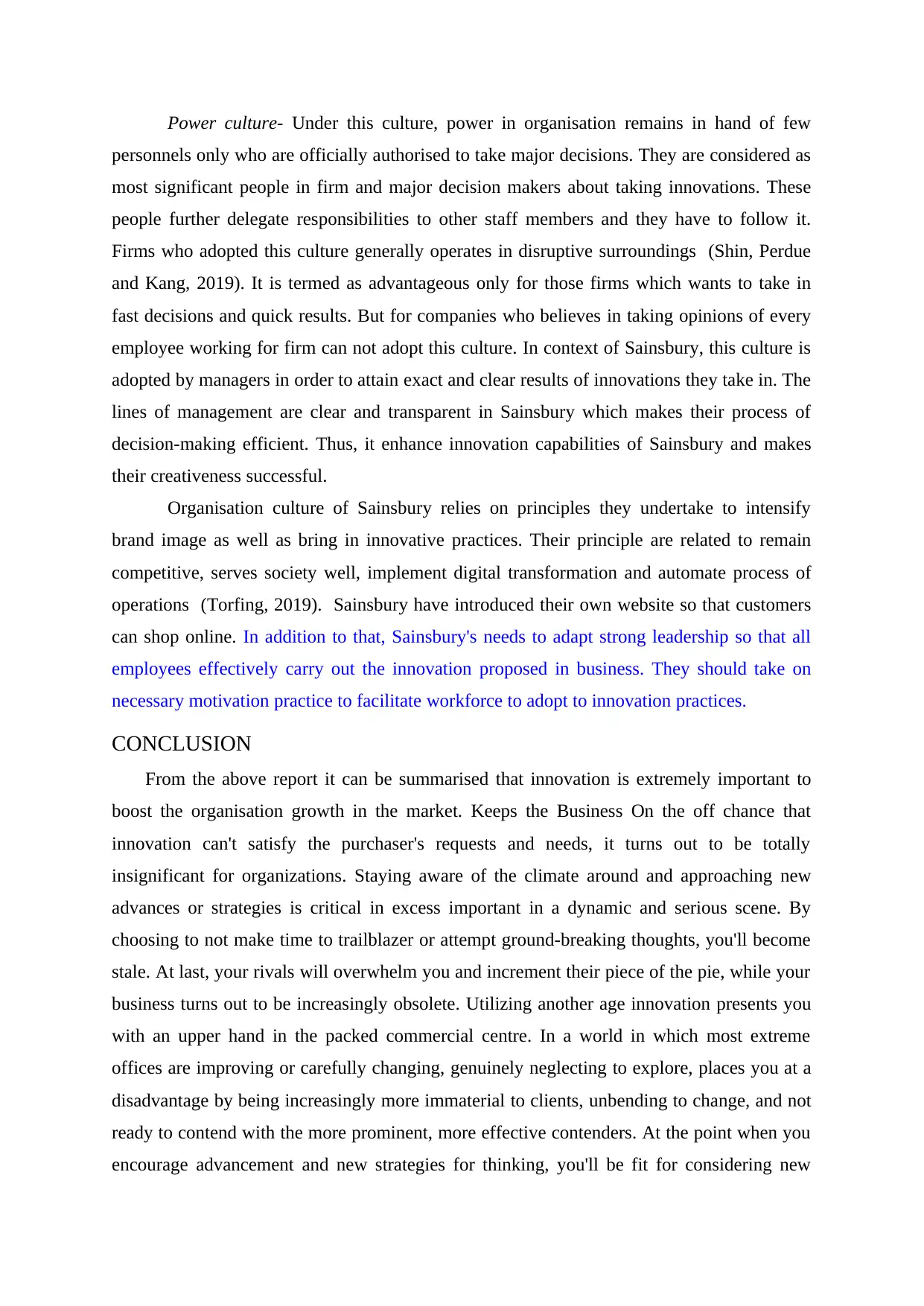
Power culture- Under this culture, power in organisation remains in hand of few
personnels only who are officially authorised to take major decisions. They are considered as
most significant people in firm and major decision makers about taking innovations. These
people further delegate responsibilities to other staff members and they have to follow it.
Firms who adopted this culture generally operates in disruptive surroundings (Shin, Perdue
and Kang, 2019). It is termed as advantageous only for those firms which wants to take in
fast decisions and quick results. But for companies who believes in taking opinions of every
employee working for firm can not adopt this culture. In context of Sainsbury, this culture is
adopted by managers in order to attain exact and clear results of innovations they take in. The
lines of management are clear and transparent in Sainsbury which makes their process of
decision-making efficient. Thus, it enhance innovation capabilities of Sainsbury and makes
their creativeness successful.
Organisation culture of Sainsbury relies on principles they undertake to intensify
brand image as well as bring in innovative practices. Their principle are related to remain
competitive, serves society well, implement digital transformation and automate process of
operations (Torfing, 2019). Sainsbury have introduced their own website so that customers
can shop online. In addition to that, Sainsbury's needs to adapt strong leadership so that all
employees effectively carry out the innovation proposed in business. They should take on
necessary motivation practice to facilitate workforce to adopt to innovation practices.
CONCLUSION
From the above report it can be summarised that innovation is extremely important to
boost the organisation growth in the market. Keeps the Business On the off chance that
innovation can't satisfy the purchaser's requests and needs, it turns out to be totally
insignificant for organizations. Staying aware of the climate around and approaching new
advances or strategies is critical in excess important in a dynamic and serious scene. By
choosing to not make time to trailblazer or attempt ground-breaking thoughts, you'll become
stale. At last, your rivals will overwhelm you and increment their piece of the pie, while your
business turns out to be increasingly obsolete. Utilizing another age innovation presents you
with an upper hand in the packed commercial centre. In a world in which most extreme
offices are improving or carefully changing, genuinely neglecting to explore, places you at a
disadvantage by being increasingly more immaterial to clients, unbending to change, and not
ready to contend with the more prominent, more effective contenders. At the point when you
encourage advancement and new strategies for thinking, you'll be fit for considering new
personnels only who are officially authorised to take major decisions. They are considered as
most significant people in firm and major decision makers about taking innovations. These
people further delegate responsibilities to other staff members and they have to follow it.
Firms who adopted this culture generally operates in disruptive surroundings (Shin, Perdue
and Kang, 2019). It is termed as advantageous only for those firms which wants to take in
fast decisions and quick results. But for companies who believes in taking opinions of every
employee working for firm can not adopt this culture. In context of Sainsbury, this culture is
adopted by managers in order to attain exact and clear results of innovations they take in. The
lines of management are clear and transparent in Sainsbury which makes their process of
decision-making efficient. Thus, it enhance innovation capabilities of Sainsbury and makes
their creativeness successful.
Organisation culture of Sainsbury relies on principles they undertake to intensify
brand image as well as bring in innovative practices. Their principle are related to remain
competitive, serves society well, implement digital transformation and automate process of
operations (Torfing, 2019). Sainsbury have introduced their own website so that customers
can shop online. In addition to that, Sainsbury's needs to adapt strong leadership so that all
employees effectively carry out the innovation proposed in business. They should take on
necessary motivation practice to facilitate workforce to adopt to innovation practices.
CONCLUSION
From the above report it can be summarised that innovation is extremely important to
boost the organisation growth in the market. Keeps the Business On the off chance that
innovation can't satisfy the purchaser's requests and needs, it turns out to be totally
insignificant for organizations. Staying aware of the climate around and approaching new
advances or strategies is critical in excess important in a dynamic and serious scene. By
choosing to not make time to trailblazer or attempt ground-breaking thoughts, you'll become
stale. At last, your rivals will overwhelm you and increment their piece of the pie, while your
business turns out to be increasingly obsolete. Utilizing another age innovation presents you
with an upper hand in the packed commercial centre. In a world in which most extreme
offices are improving or carefully changing, genuinely neglecting to explore, places you at a
disadvantage by being increasingly more immaterial to clients, unbending to change, and not
ready to contend with the more prominent, more effective contenders. At the point when you
encourage advancement and new strategies for thinking, you'll be fit for considering new

procedures for achieving business and upgrading your items and administrations. With the
regards to Sainsbury the organisation has used the advance version and came with the
technology will give rise to their profit as well as it will also increase of the customers
towards them. The experience which will be given in the stores will increase their brand
image in the market .
regards to Sainsbury the organisation has used the advance version and came with the
technology will give rise to their profit as well as it will also increase of the customers
towards them. The experience which will be given in the stores will increase their brand
image in the market .
Paraphrase This Document
Need a fresh take? Get an instant paraphrase of this document with our AI Paraphraser
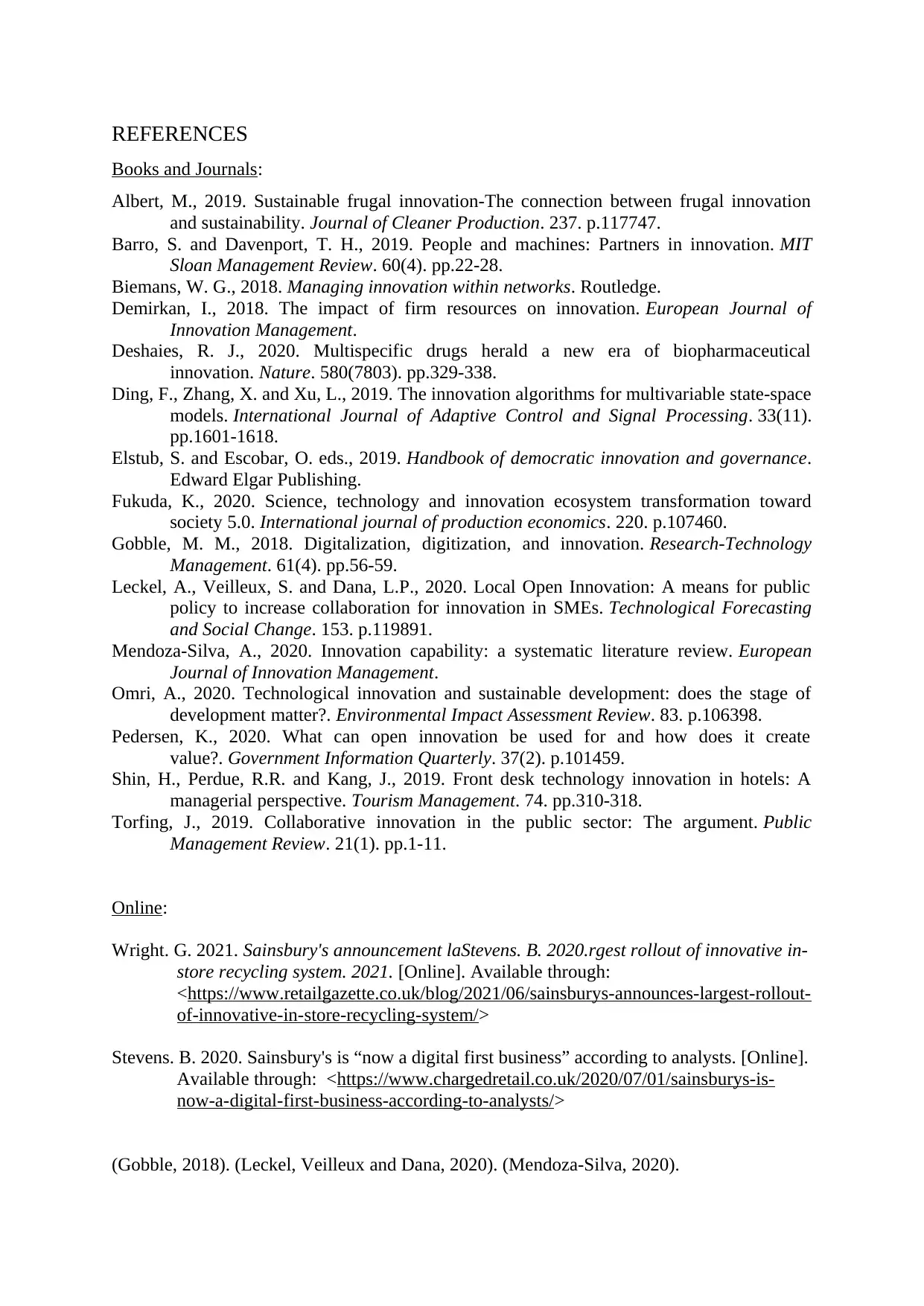
REFERENCES
Books and Journals:
Albert, M., 2019. Sustainable frugal innovation-The connection between frugal innovation
and sustainability. Journal of Cleaner Production. 237. p.117747.
Barro, S. and Davenport, T. H., 2019. People and machines: Partners in innovation. MIT
Sloan Management Review. 60(4). pp.22-28.
Biemans, W. G., 2018. Managing innovation within networks. Routledge.
Demirkan, I., 2018. The impact of firm resources on innovation. European Journal of
Innovation Management.
Deshaies, R. J., 2020. Multispecific drugs herald a new era of biopharmaceutical
innovation. Nature. 580(7803). pp.329-338.
Ding, F., Zhang, X. and Xu, L., 2019. The innovation algorithms for multivariable state‐space
models. International Journal of Adaptive Control and Signal Processing. 33(11).
pp.1601-1618.
Elstub, S. and Escobar, O. eds., 2019. Handbook of democratic innovation and governance.
Edward Elgar Publishing.
Fukuda, K., 2020. Science, technology and innovation ecosystem transformation toward
society 5.0. International journal of production economics. 220. p.107460.
Gobble, M. M., 2018. Digitalization, digitization, and innovation. Research-Technology
Management. 61(4). pp.56-59.
Leckel, A., Veilleux, S. and Dana, L.P., 2020. Local Open Innovation: A means for public
policy to increase collaboration for innovation in SMEs. Technological Forecasting
and Social Change. 153. p.119891.
Mendoza-Silva, A., 2020. Innovation capability: a systematic literature review. European
Journal of Innovation Management.
Omri, A., 2020. Technological innovation and sustainable development: does the stage of
development matter?. Environmental Impact Assessment Review. 83. p.106398.
Pedersen, K., 2020. What can open innovation be used for and how does it create
value?. Government Information Quarterly. 37(2). p.101459.
Shin, H., Perdue, R.R. and Kang, J., 2019. Front desk technology innovation in hotels: A
managerial perspective. Tourism Management. 74. pp.310-318.
Torfing, J., 2019. Collaborative innovation in the public sector: The argument. Public
Management Review. 21(1). pp.1-11.
Online:
Wright. G. 2021. Sainsbury's announcement laStevens. B. 2020.rgest rollout of innovative in-
store recycling system. 2021. [Online]. Available through:
<https://www.retailgazette.co.uk/blog/2021/06/sainsburys-announces-largest-rollout-
of-innovative-in-store-recycling-system/>
Stevens. B. 2020. Sainsbury's is “now a digital first business” according to analysts. [Online].
Available through: <https://www.chargedretail.co.uk/2020/07/01/sainsburys-is-
now-a-digital-first-business-according-to-analysts/>
(Gobble, 2018). (Leckel, Veilleux and Dana, 2020). (Mendoza-Silva, 2020).
Books and Journals:
Albert, M., 2019. Sustainable frugal innovation-The connection between frugal innovation
and sustainability. Journal of Cleaner Production. 237. p.117747.
Barro, S. and Davenport, T. H., 2019. People and machines: Partners in innovation. MIT
Sloan Management Review. 60(4). pp.22-28.
Biemans, W. G., 2018. Managing innovation within networks. Routledge.
Demirkan, I., 2018. The impact of firm resources on innovation. European Journal of
Innovation Management.
Deshaies, R. J., 2020. Multispecific drugs herald a new era of biopharmaceutical
innovation. Nature. 580(7803). pp.329-338.
Ding, F., Zhang, X. and Xu, L., 2019. The innovation algorithms for multivariable state‐space
models. International Journal of Adaptive Control and Signal Processing. 33(11).
pp.1601-1618.
Elstub, S. and Escobar, O. eds., 2019. Handbook of democratic innovation and governance.
Edward Elgar Publishing.
Fukuda, K., 2020. Science, technology and innovation ecosystem transformation toward
society 5.0. International journal of production economics. 220. p.107460.
Gobble, M. M., 2018. Digitalization, digitization, and innovation. Research-Technology
Management. 61(4). pp.56-59.
Leckel, A., Veilleux, S. and Dana, L.P., 2020. Local Open Innovation: A means for public
policy to increase collaboration for innovation in SMEs. Technological Forecasting
and Social Change. 153. p.119891.
Mendoza-Silva, A., 2020. Innovation capability: a systematic literature review. European
Journal of Innovation Management.
Omri, A., 2020. Technological innovation and sustainable development: does the stage of
development matter?. Environmental Impact Assessment Review. 83. p.106398.
Pedersen, K., 2020. What can open innovation be used for and how does it create
value?. Government Information Quarterly. 37(2). p.101459.
Shin, H., Perdue, R.R. and Kang, J., 2019. Front desk technology innovation in hotels: A
managerial perspective. Tourism Management. 74. pp.310-318.
Torfing, J., 2019. Collaborative innovation in the public sector: The argument. Public
Management Review. 21(1). pp.1-11.
Online:
Wright. G. 2021. Sainsbury's announcement laStevens. B. 2020.rgest rollout of innovative in-
store recycling system. 2021. [Online]. Available through:
<https://www.retailgazette.co.uk/blog/2021/06/sainsburys-announces-largest-rollout-
of-innovative-in-store-recycling-system/>
Stevens. B. 2020. Sainsbury's is “now a digital first business” according to analysts. [Online].
Available through: <https://www.chargedretail.co.uk/2020/07/01/sainsburys-is-
now-a-digital-first-business-according-to-analysts/>
(Gobble, 2018). (Leckel, Veilleux and Dana, 2020). (Mendoza-Silva, 2020).

1 out of 15
Related Documents
Your All-in-One AI-Powered Toolkit for Academic Success.
+13062052269
info@desklib.com
Available 24*7 on WhatsApp / Email
![[object Object]](/_next/static/media/star-bottom.7253800d.svg)
Unlock your academic potential
© 2024 | Zucol Services PVT LTD | All rights reserved.




